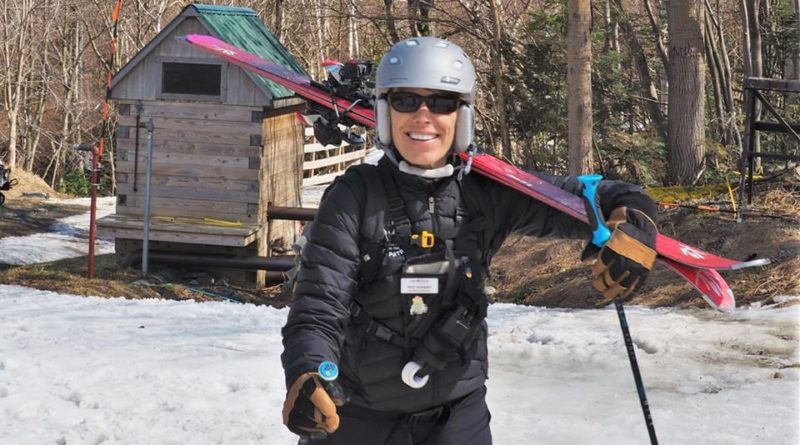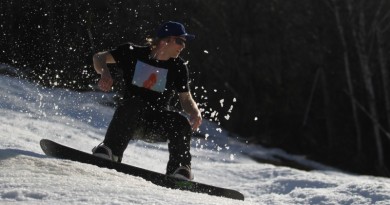Local Heroes: The Patrol Director
Peg Doheny has made a career of finding lost skiers in Jay Peak’s rugged backcountry terrain—and keeping them safe on the hill.
Peg Doheny Age: 65 From: Everett, Washington Lives in: Montgomery Center Family: Husband, Mickey Doheny Primary Sports: Alpine skiing, Nordic Skating Claim to Fame: Served as Ski Patrol Director at Jay Peak for 40 years Occupation: Member of the Governor’s Search and Rescue Council, part-time patroller
On January 10, 2018, as a storm began dumping what would become more than 40 inches of fresh snow on Jay Peak, a party of four backcountry skiers reported their friend, an experienced older skier and Northeast Kingdom local, missing in the backcountry. It was about 3:45 p.m. and getting dark. “We had been skiing and working all day because the snow was great, but the visibility was really low coming down the mountain, and temperatures were dropping,” recalls Peg Doheny, who was working Jay Peak’s patrol at the time.
As her fellow patrollers finished their final sweep of the mountain and prepared to set out for a search, Doheny settled into the patrol room to take notes and help Assistant Director Russ Ford coordinate the search. The skier was rescued later that night, with the aid of a local farmer and his tractor, alive but cold.
For 40 years, as Jay Peak’s first female patrol director, Peg Doheny was the person who called the shots to keep patrollers and skiers safe in the wild and unique terrain of Jay Peak. In May 2018, she decided to pass the torch to new patrol director Dave Marchand. This was her first SAR (search and rescue) after passing the reins—though she still patrols two days a week and now serves on the Governor’s Search and Rescue Council.
Unlike other Vermont ski areas, Jay Peak has no municipal or volunteer squad of backcountry emergency responders who are on standby to assist ski patrol when things go awry beyond the ski area’s rugged bounds. With other aid often an hour’s drive away, missing and injured skiers are the responsibility of ski patrol. As Jay’s longtime ski patrol director, Doheny is the mastermind behind many successful rescues.
Since working her first season at the resort in 1979, Doheny estimates she’s been part of more than 20 search and rescue operations at Jay Peak. She’s directed searches, managing logistics and personnel from the base and she’s participated in serious, technical rescues on the ground. One memorable rescue involved belaying a skier (in a sled) who had fallen and injured a leg out of Pump House chute, a narrow, rocky crevice on the mountain’s steep face.
Under Doheny’s leadership Jay Peak patrollers started using GPS technology and began to learn backcountry rescue skills. “Back in the 1990s we started doing more search training. We had and still have a fair number of hunters on patrol, people who were used to moving through the woods in the dark by headlamp,” says Doheny, who drew on the skills of her team to develop Jay Peak’s backcountry rescue training program for patrollers in the early 1990s.
“Smugglers’ Notch and Stowe have the Stowe Mountain Rescue Team. At Jay Peak, we have incredible backcountry terrain and we like to let people travel uphill during the day. We try to support skiers who want to challenge themselves. But we—ski patrol—are the only game in this area if someone gets lost,” says Doheny. This often happens at a place called Black Falls—an alluring gladed terrain trap that drops skiers into a large gully with very poor GPS and cell service.
Back in the early 1990s, when Doheny’s program was green, the Jay Peak patrollers’ knowledge was put to the test when three boys disappeared into the Black Falls area overnight. The skiers were lost for several nights in sub-freezing temperatures. Doheny was coordinating the search, which involved massive resources, from Jay Peak’s patrol room. “It became very big. We had to bring in helicopters. The state police were involved and eventually the National Guard. The scale was unprecedented.” In the end, the boys were found, separated from each other, in the Black Falls area. One hiked out on his own and the other two survived—barely.
Experiences like this one earned Doheny her position on the Governor’s Search and Rescue Council in 2014, where she currently advises the state about how to better coordinate search and rescue efforts.
Doheny came to Vermont from Washington state to ski in 1973, “when plastic boots were just barely happening and Seattle wasn’t hip like it is today.” Backcountry skiing wasn’t as popular then and all of the action, as far as Doheny could see, was in the White Mountains and the Adirondacks. “In Montgomery, I found community, great music, the ability to ski out my back door, ride my bike anywhere and kayaking.” She says that back then, Jay Peak had a “wild West” kind of a vibe. “It’s a family mountain now and that’s great. Before, it was really just hard-core skiers. There was quite the live music and bar scene in Montgomery and even Jay.” In short, she found her people.
With a degree from Johnson State College in environmental economics, she became a ski bum. In 1989, she married Mickey Doheny, a longtime friend who went on to become the director of Jay Peak’s Ski School (he is now officially retired but runs the Ambassador Program).
Doheny was unfazed by the prospect of entering a field with few women and within four years of joining patrol, she became its director. “I was in the right place at the right time. We have a much higher percentage of women on patrol now. I just like the freedom of going out to work on the mountain. It was challenging and interesting and something I could grow with. I started as a ski instructor, but I wasn’t much of a teacher. I’m more of a doer.”
Though she officially retired in May 2018, Doheny still spends two days a week working on patrol at Jay Peak. “I love Jay Peak. There are just so many good people who work up there.”
When the Dohenys both retired last year, Jay Peak went so far as to rename a trail for them. Powerline, a black diamond and favorite run among patrollers, was renamed “601” for Peg’s radio I.D. Lower Powerline, a classic blue, was renamed “Mickey.”
“We used to call each other on the radio to meet up, which everyone can hear of course. We all have radio numbers, but I’d just call him Mickey. So now Powerline is ‘601 to Mickey,’ which is a tremendous honor.”
Doheny says she spends more time playing hockey, alpine skiing (she prefers catching speed in the steeps to skiing glades these days) and pursuing her other passion: Nordic skating on the Northeast Kingdom’s frozen ponds and lakes. “I wanted to leave the job while I still loved it. We had a great group of patrollers who were ready for leadership. As director, I was all about change and I felt it was time to let these younger people come in and keep moving the program forward.”


